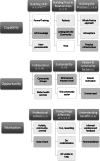Social prescribing for individuals with mental health problems: a qualitative study of barriers and enablers experienced by general practitioners
- PMID: 32957923
- PMCID: PMC7507286
- DOI: 10.1186/s12875-020-01264-0
Social prescribing for individuals with mental health problems: a qualitative study of barriers and enablers experienced by general practitioners
Abstract
Background: There is growing evidence for the use of social prescribing as a means to improve the mental health of patients. However, there are gaps in understanding the barriers and enablers faced by General Practitioners (GPs) when engaging in social prescribing for patients with mental health problems.
Methods: This study uses a qualitative approach involving one-to-one interviews with GPs from across the UK. The COM-B model was used to elucidate barriers and enablers, and the Theoretical Domains Framework (TDF) and a Behaviour Change Theory and Techniques tool was used to identify interventions that could address these.
Results: GPs recognised the utility of social prescribing in addressing the high levels of psychosocial need they saw in their patient population, and expressed the need to de-medicalise certain patient problems. GPs were driven by a desire to help patients, and so they benefited from regular positive feedback to reinforce the value of their social prescribing referrals. They also discussed the importance of developing more robust evidence on social prescribing, but acknowledged the challenges of conducting rigorous research in community settings. GPs lacked the capacity, and formal training, to effectively engage with community groups for patients with mental health problems. Link workers, when available to GPs, were of fundamental importance in bridging the gap between the GP and community. The formation of trusting relationships was crucial at different points of the social prescribing pathway, with patients needing to trust GPs in order for them to agree to see a link worker or attend a community activity, and GPs requiring a range of strong inter-personal skills in order to gain patients' trust and motivate them.
Conclusion: This study elucidates the barriers and enablers to social prescribing for patients with mental health problems, from the perspectives of GPs. Recommended interventions include a more systematic feedback structure for GPs and more formal training around social prescribing and developing the relevant inter-personal skills. This study provides insight for GPs and other practice staff, commissioners, managers, providers and community groups, to help design and deliver future social prescribing services.
Keywords: Behaviour(al) change theory; COM-B; Community; Community engagement; GP behaviour; General practice (GP); Mental health; Social prescribing; Theoretical domains framework (TDF); United Kingdom (UK).
Conflict of interest statement
The authors declare they have no competing interests.
Figures

Similar articles
-
Mental health problems of undocumented migrants in the Netherlands: A qualitative exploration of recognition, recording, and treatment by general practitioners.Scand J Prim Health Care. 2015 Jun;33(2):82-90. doi: 10.3109/02813432.2015.1041830. Epub 2015 May 11. Scand J Prim Health Care. 2015. PMID: 25961462 Free PMC article.
-
Factors influencing the prescribing behaviour of independent prescriber optometrists: a qualitative study using the Theoretical Domains Framework.Ophthalmic Physiol Opt. 2021 Mar;41(2):301-315. doi: 10.1111/opo.12782. Epub 2021 Feb 20. Ophthalmic Physiol Opt. 2021. PMID: 33608897
-
'It's difficult, I think it's complicated': Health care professionals' barriers and enablers to providing opportunistic behaviour change interventions during routine medical consultations.Br J Health Psychol. 2019 Sep;24(3):571-592. doi: 10.1111/bjhp.12368. Epub 2019 Apr 12. Br J Health Psychol. 2019. PMID: 30977291 Free PMC article.
-
Mental health practitioner experiences of engaging with service users in community mental health settings: A systematic review and thematic synthesis of qualitative evidence.J Psychiatr Ment Health Nurs. 2020 Dec;27(6):807-820. doi: 10.1111/jpm.12628. Epub 2020 Apr 1. J Psychiatr Ment Health Nurs. 2020. PMID: 32171046
-
A Systematic Review of Mental Health Professionals, Patients, and Carers' Perceived Barriers and Enablers to Supporting Smoking Cessation in Mental Health Settings.Nicotine Tob Res. 2022 Jun 15;24(7):945-954. doi: 10.1093/ntr/ntac004. Nicotine Tob Res. 2022. PMID: 35018458 Free PMC article.
Cited by
-
Training needs and curriculum of continuing medical education among general practitioners in Tibet, China: A cross-sectional survey.Front Public Health. 2022 Oct 11;10:914847. doi: 10.3389/fpubh.2022.914847. eCollection 2022. Front Public Health. 2022. PMID: 36304244 Free PMC article.
-
Promoting Social Prescribing in Psychiatry-Using Shared Decision-Making and Peer Support.JAMA Psychiatry. 2023 Aug 1;80(8):759-760. doi: 10.1001/jamapsychiatry.2023.0788. JAMA Psychiatry. 2023. PMID: 37223893 Free PMC article.
-
The effect of environmental change, planned and unplanned life events on the long-term outcome of common mental disorders.Soc Psychiatry Psychiatr Epidemiol. 2024 Sep;59(9):1587-1598. doi: 10.1007/s00127-023-02520-1. Epub 2023 Jul 10. Soc Psychiatry Psychiatr Epidemiol. 2024. PMID: 37428194 Free PMC article.
-
Multimorbidity Patterns and Their Association with Social Determinants, Mental and Physical Health during the COVID-19 Pandemic.Int J Environ Res Public Health. 2022 Dec 15;19(24):16839. doi: 10.3390/ijerph192416839. Int J Environ Res Public Health. 2022. PMID: 36554719 Free PMC article.
-
Barriers and facilitators to social prescribing in child and youth mental health: perspectives from the frontline.Eur Child Adolesc Psychiatry. 2024 May;33(5):1465-1479. doi: 10.1007/s00787-023-02257-x. Epub 2023 Jul 5. Eur Child Adolesc Psychiatry. 2024. PMID: 37405485 Free PMC article.
References
-
- WHO | Disease and injury country estimates. WHO. World Health Organization. Available from: https://www.who.int/healthinfo/global_burden_disease/estimates_country/en/. Cited 2020 Apr 16.
-
- Baker C. Mental health statistics for England: prevalence, services and funding. 2018.
-
- Barr B, Kinderman P, Whitehead M. Trends in mental health inequalities in England during a period of recession, austerity and welfare reform 2004 to 2013. Soc Sci Med. 2015;147:324–31. - PubMed
-
- Wildman J. Income related inequalities in mental health in Great Britain: analysing the causes of health inequality over time. J Health Econ. 2003;22(2):295–312. - PubMed
Publication types
MeSH terms
Grants and funding
LinkOut - more resources
Full Text Sources
Miscellaneous

